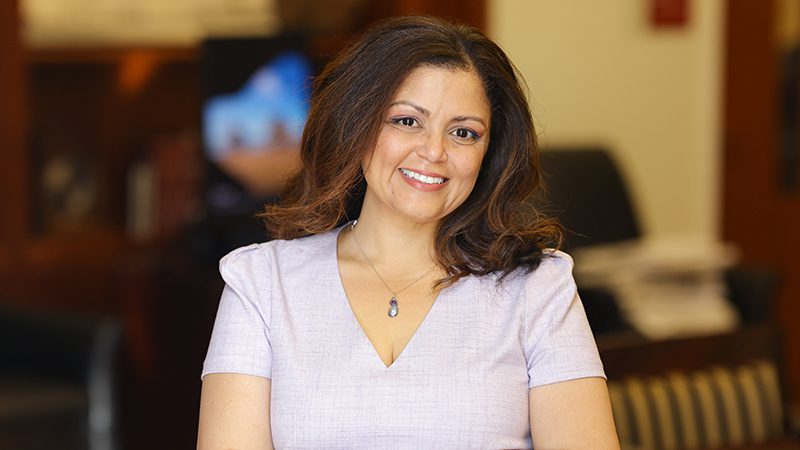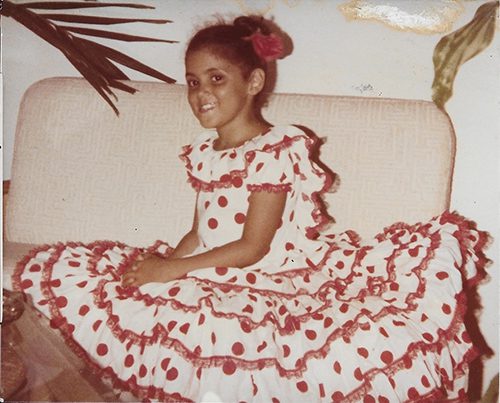A ‘holistic journey’ from Puerto Rico to Furman’s library

Hispanic Heritage Month at Furman
Read more stories >>
Nashieli Marcano’s professional and scholarly pursuits have taken her throughout the United States, from Puerto Rico to Greenville, South Carolina, and from NASA to the James B. Duke Library at Furman University.
“It’s been quite a journey,” she said. “I treat my career as a holistic thing. Everything connects somehow.”
Her balancing act between science and the humanities began with earning both a B.A. in foreign languages and a B.S. in engineering technology from the University of Central Florida. In Cape Canaveral, Marcano worked in technical operations for a company that handled the operations of the space shuttle fleet. Her academic interests led her to an M.S. in library and information studies at Florida State University, an M.A. in Spanish at Bowling Green State University in Ohio, a Ph.D. in Hispanic languages and literatures at the University of Pittsburgh and a graduate certificate in digital public humanities at George Mason University in Virginia.
Her resume includes faculty and library positions in both humanities and STEM fields at universities in Florida, Ohio, Georgia, and South Carolina, leading her to Greenville in 2021 and her current position as archivist for digital collections at Furman University Libraries.
Childhood in ‘a modern colony’
Marcano’s lifetime of travel began when she was a baby.

Nashieli Marcano dressed as a bailaora (flamenco dancer) at age 7 in Isla Verde, Puerto Rico.
“My parents are both from Puerto Rico, and they had gone to Mexico to study,” she said. After all, explained Marcano, college students in the early ’70s who were interested in social justice and sought a central place to reflect on events transpiring in Chile, Argentina and Brazil, went to Mexico City and experienced student life at the UNAM.
About a month after her birth in Mexico, family members brought Marcano back to Puerto Rico, where she grew up. Her mother, Eda Correa, was an academic librarian, and her father, Pablo Marcano García, had become involved in the island’s nationalist political activism and movement, seeking independence from the United States.
“If you know some of the history of the island, you’d recognize it as a modern colony,” she said.
After occupying the Chilean embassy in San Juan for 22 hours in 1978 and demanding freedom for Puerto Rican political prisoners, Marcano’s father became a political prisoner himself, she said. He was sentenced to 22 years in a federal prison in upstate New York and was released after seven years. He is now a celebrated Puerto Rican artist whose paintings have been exhibited worldwide
‘Always more work to be done’
After more than three decades in the U.S., “it’s hard to say that I belong in a particular group,” said Marcano, who joined a growing Puerto Rican population in Orlando, Florida, in 1990. “But that gives me the flexibility to negotiate and cultivate identity and belonging among different communities. I could relate to white folks, Black folks and Latinos. At the end of the day, there’s no home for me, but that’s just part of the journey as a displaced Puerto Rican. I’m comfortable with that realization.”
Learning about scholarly and community projects such as a collection of oral histories of Colombian textile workers in Greenville helped attract Marcano to Furman, she said. She has been expanding Furman’s digital collection in areas related to diversity, equity and inclusion, leading an audit of archive materials to ensure they reflect those who access them. Other projects include developing the LGBTQIA+ @ Furman digital timeline and creating a coordinated oral history plan for faculty, staff and the community.
With the strategic diversity plan and other initiatives, Furman has shown “some great progress compared to other institutions where I’ve been, and we have to take advantage of that,” said Marcano. “There’s always more work to be done.”
Hispanic Heritage Month “is a moment of reflections and appreciation of our contributions to the campus community,” she said. “It’s a rich and heterogenous culture. Latinos are a valuable part of the Furman and Greenville communities, and of the American fabric.”
She added: “This is perhaps the place where I felt the most welcomed – as a librarian, period, as a professional and a human being.”